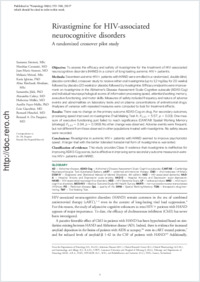Rivastigmine for HIV-associated neurocognitive disorders A randomized crossover pilot study
- Simioni, Samanta Departments of Neurology, CHUV, Lausanne, Switzerland
- Cavassini, Matthias Infectious Diseases, CHUV, Lausanne, Switzerland
- Annoni, Jean-Marie University of Fribourg and Hospital of Fribourg, Switzerland
- Iglesias, Mélanie Métral, Katia Clinical Research Center, CHUV, Lausanne, Switzerland
- Abraham, Aline Rimbault Departments of Neurology, HUG, Geneva, Switzerland
- Jilek, Samantha Immunology and Allergy, CHUV, Lausanne, Switzerland
- Calmy, Alexandra HIV/AIDS, HUG, Geneva, Switzerland
- Müller, Hubertus Departments of Neurology, HUG, Geneva, Switzerland
- Fayet-Mello, Aurélie Clinical Pharmacology, CHUV, Lausanne, Switzerland
- Giacobini, Ezio Rehabilitation and Geriatrics HUG, Geneva, Switzerland
- Hirschel, Bernard HIV/AIDS, HUG, Geneva, Switzerland
- Pasquier, Renaud A. Du Departments of Neurology, CHUV, Lausanne, Switzerland - Immunology and Allergy, CHUV, Lausanne, Switzerland
-
02.05.2013
Published in:
- Neurology. - 2013, vol. 80, no. 6, p. 553–560
English
Objective: To assess the efficacy and safety of rivastigmine for the treatment of HIV-associated neurocognitive disorders (HAND) in a cohort of long-lasting aviremic HIV+ patients.Methods: Seventeen aviremic HIV+ patients with HAND were enrolled in a randomized, double-blind, placebo-controlled, crossover study to receive either oral rivastigmine (up to 12 mg/day for 20 weeks) followed by placebo (20 weeks) or placebo followed by rivastigmine. Efficacy endpoints were improvement on rivastigmine in the Alzheimer's Disease Assessment Scale–Cognitive subscale (ADAS-Cog) and individual neuropsychological scores of information processing speed, attention/working memory, executive functioning, and motor skills. Measures of safety included frequency and nature of adverse events and abnormalities on laboratory tests and on plasma concentrations of antiretroviral drugs. Analyses of variance with repeated measures were computed to look for treatment effects.Results: There was no change on the primary outcome ADAS-Cog on drug. For secondary outcomes, processing speed improved on rivastigmine (Trail Making Test A: F1,13 = 5.57, p = 0.03). One measure of executive functioning just failed to reach significance (CANTAB Spatial Working Memory [strategy]: F1,13 = 3.94, p = 0.069). No other change was observed. Adverse events were frequent, but not different from those observed in other populations treated with rivastigmine. No safety issues were recorded.Conclusions: Rivastigmine in aviremic HIV+ patients with HAND seemed to improve psychomotor speed. A larger trial with the better tolerated transdermal form of rivastigmine is warranted.Classification of evidence: This study provides Class III evidence that rivastigmine is ineffective for improving ADAS-Cog scores, but is effective in improving some secondary outcome measures in aviremic HIV+ patients with HAND.
- Faculty
- Faculté des sciences et de médecine
- Department
- Médecine 3ème année
- Language
-
- English
- Classification
- Medicine
- License
-
License undefined
- Identifiers
-
- RERO DOC 209518
- DOI 10.1212/WNL.0b013e3182815497
- Persistent URL
- https://folia.unifr.ch/unifr/documents/303404
Statistics
Document views: 138
File downloads:
- pdf: 291
